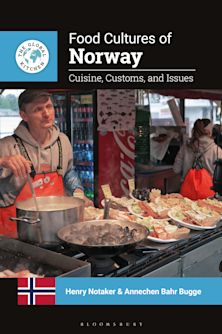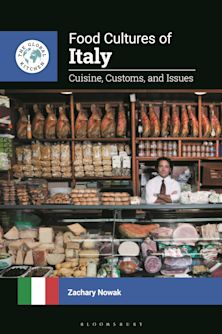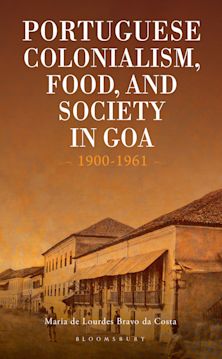- Home
- ACADEMIC
- Food
- Food History
- Culinary Nationalism in Asia
You must sign in to add this item to your wishlist. Please sign in or create an account
Description
Winner of the Association for the Study of Food and Society's Best Edited Volume 2021
With culinary nationalism defined as a process in flux, as opposed to the limited concept of national cuisine, the contributors of this book call for explicit critical comparisons of cases of culinary nationalism among Asian regions, with the intention of recognizing patterns of modern culinary development. As a result, the formation of modern cuisine is revealed to be a process that takes place around the world, in different forms and periods, and not
exclusive to current Eurocentric models.
Key themes include the historical legacies of imperialism/colonialism, nationalism, the Cold War, and global capitalism in Asian cuisines; internal culinary boundaries between genders, ethnicities, social classes, religious groups, and perceived traditions/modernities; and global contexts of Asian cuisines as both nationalist and internationalist enterprises, and "Asia" itself as a vibrant culinary imaginary.
The book, which includes a foreword from Krishnendu Ray and an afterword from James L. Watson, sets out a fresh agenda for thinking about future food studies scholarship.
Table of Contents
List of Maps
Foreword: Food in the Making and Unmaking of Asian Nationalisms Krishnendu Ray
Acknowledgments
Maps
Introduction: Culinary Nationalism in Asia Michelle T. King
Part One Historical Legacies
1 “Vegetarian” Nationalism: Critiques of Meat Eating for Japanese Bodies, 1880–1938 Tatsuya Mitsuda
2 Food, Gender, and Domesticity in Nationalist North India: Between Digestion and Desire Rachel Berger
3 A Cookbook in Search of a Country: Fu Pei-mei and the Conundrum of Chinese Culinary Nationalism Michelle T. King
4 From Military Rations to UNESCO Heritage: A Short History of Korean Kimchi Katarzyna J. Cwiertka
Part Two Internal Boundaries
5 Priestess of Sake: Woman as Producer in Natsuko's Sake Satoko Kakihara
6 Defining “Modern Malaysian” Cuisine: Fusion or Ingredients? Gaik Cheng Khoo
7 Eating to Live: Sustaining the Body and Feeding the Spirit in the Films of Tsai Ming-liang Michelle E. Bloom
8 The Politicization of Beef and Meat in Contemporary India: Protecting Animals and Alienating Minorities Michaël Bruckert
Part Three Global Contexts
9 Writing an “International” Cuisine in Japan: Murai Gensai's 1903 Culinary Novel Kuidoraku Eric C. Rath
10 Red (Michelin) Stars Over China: Seeking Recognition in a Transnational Culinary Field James Farrer
11 Drinking Scorpions at Trader Vic's: Polynesian Parties, Caribbean Rum, Chinese Cooks, and American Tourists Daniel E. Bender
12 Laksa Nation: Tastes of “Asian” Belonging, Borrowed and Reimagined Jean Duruz
Afterword: Feasting and the Pursuit of National Unity-American Thanksgiving and Cantonese Common-Pot Dining James L. Watson
Notes on Contributors
Index
Product details

| Published | 11 Jul 2019 |
|---|---|
| Format | Ebook (PDF) |
| Edition | 1st |
| Extent | 304 |
| ISBN | 9781350078680 |
| Imprint | Bloomsbury Academic |
| Illustrations | 25 bw illus |
| Publisher | Bloomsbury Publishing |
About the contributors
Reviews
-
This edited collection addresses a topic that is both timely and critical considering the current state of international relations. It contributes to the further refinement of theoretical considerations around the use of food to construct and assert national identities, setting those strategies within historical as well as contemporary contexts. Although it focuses on nations in Asia, its observations are universally relevant, and can be applied to all cultural forms, not just food … As such, this volume will become foundational reading in a number of disciplines, including Asian studies, international studies, mobility studies, history, heritage studies, and political science, as well as food studies.
ASFS Book Award Judges
-
Gathering a prominent group of scholars and publishing a book on this topic, is quite an accomplishment
that definitely puts Dr. King's name on the list of food scholars.Food, Culture & Society
-
With chapters by leading scholars in Asian food studies, Michelle King's essential volume takes us beyond the usual accounts of national cuisines as menus of inclusion and exclusion to analyze more diverse expressions of culinary nationalism.
Jeffrey M. Pilcher, University of Toronto, Canada
-
This book will be a great discovery to everyone interested in transformation of cuisine and nation-making in modern Asia. It brings readers to understand the 'meal' in the political context for different historical trajectories in various Asian countries. The editor has done a great job by using the framework of culinary nationalism to enhance the vibrant discussions of food in relations to government policy, market consumption, and individual choices with excellent case studies all over Asia.
Sidney C. H. Cheung, The Chinese University of Hong Kong, Hong Kong
-
This electric collection of essays offers provocative insights into the dynamics of culinary nationalism across East, Southeast, and South Asia. Bringing together historical work, contemporary sociological analysis, and evocative studies of film and literature, Culinary Nationalism in Asia is redolent of laksa and kimchi alongside beef biryani and zongzi, and will be certain to stimulate lively debate and new work on the complex interplay between food cultures and nation-building.
Ben Siegel, Boston University, USA
-
Culinary Nationalism in Asia is a pioneering interdisciplinary work on food and nationalism in Asia. Creatively crossing disciplinary and geographical boundaries, the authors of essays illuminate an extraordinarily wide range of subjects, from religious tradition to scientific nutrition, to military ration, to the high-tech kitchen appliance. This is an outstanding contribution to food studies.
Seung-joon Lee, National University of Singapore, Singapore and author of Gourmets in the Land of Famine (2011)

ONLINE RESOURCES
Bloomsbury Collections
This book is available on Bloomsbury Collections where your library has access.



































